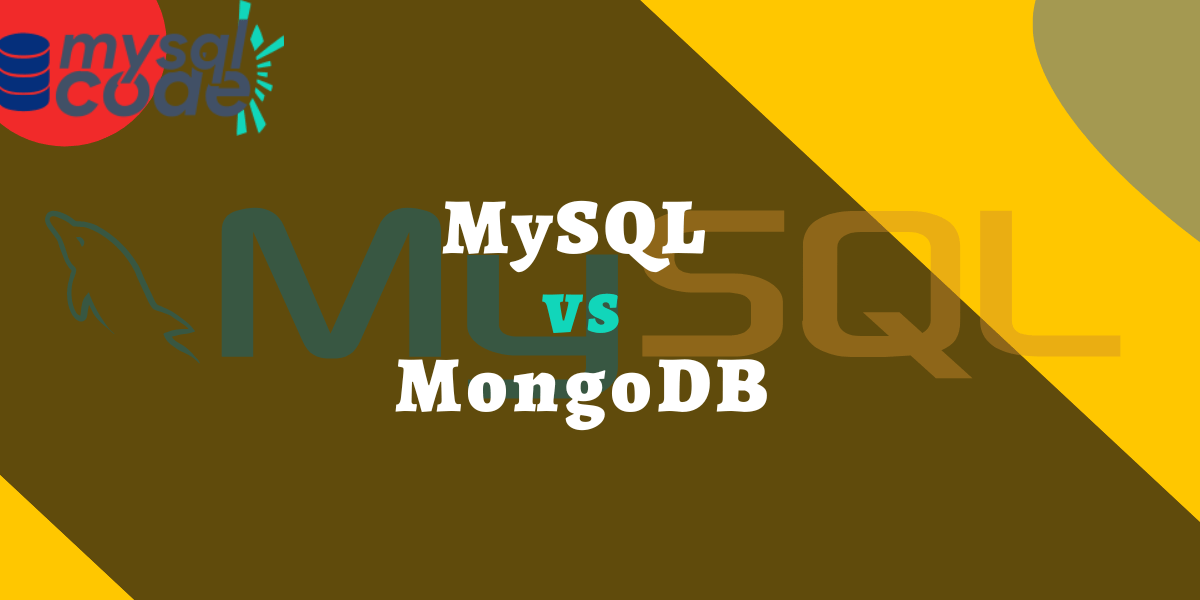In this tutorial, we will be discussing and comparing the two popular DBMSs, MySQL and MongoDB. These database management systems are popular and highly in demand. We will see detailed information about both DBMSs and then compare them with each other on particular factors. So, let’s get started!
Also read: PostgreSQL vs MySQL – Which Database Should You Choose?
MySQL vs MongoDB – At a Glance
Here’s a quick table to see the differences between MySQL and MongoDB.
| MySQL | MongoDB |
|---|---|
| MySQL is a Relational database management system. | MongoDB is a non-relational database management system. |
| MySQL uses the structured query language (SQL) to perform operations such as insert, update, delete and retrieve. | MongoDB uses the MongoDB query language to perform operations on the database. |
| In MySQL, a database consists of tables. | In MongoDB, there are collections in the database. |
| A single record in MySQL is called a tuple or a row. | In MongoDB, a single record is called as a document. |
| In MySQL, the default primary key is not provided. | MongoDB provides us with the default primary key. |
| MySQL supports foreign key constraints. | In MongoDB, you can not use the foreign key constraint. |
| MySQL supports vertical scaling. | MongoDB supports both vertical and horizontal scaling. |
| MySQL is one of the oldest databases, therefore MySQL community is huge and comes with more features. | MongoDB is relatively new, therefore the community is small in compare to MySQL community. Also, it does not provide as many features as MySQL. |
What is MySQL?
MySQL is an open-source, free, most popular relational database management system which provides tons of great features. It stores the data in the form of tables containing rows and columns. Note that, MySQL is an RDBMS as it maintains the retaliation in the database between the data using rows and columns.
MySQL makes use of structured query language (SQL) for the operations such as insert, update, delete and retrieve. Some of the biggest organizations such as Facebook, Twitter, and Wikipedia use MySQL as the backbone of their technology stack to store the data.
Let’s now see some features of MySQL.
- Open Source- MySQL is evolving in features and overcoming bugs because of its open-source nature.
- Scalable- MySQL supports multi-threading, therefore it is scalable. It can handle a large amount of data without any problem.
- Secure- MySQL is one of the most trusted and secure database management systems in the world as it is developed by the Oracle corporation.
- Robust transactions- Due to the ACID properties that MySQL supports, it is suitable for transaction operations.
Also read: SQLite vs MongoDB: An In-Depth Comparison
What is MongoDB?
Unlike MySQL, MongoDB is a non-relational document-based database management system, which is also known as an object-based system. It is one of the most popular No-SQL databases that some of the giant companies such as Vodafone, Mediastream, Volvo connect, intuit, Verizon, eBay etc.
Note that, MongoDB does not use SQL syntaxes as it is a No-SQL database. To perform operations on the database, you need to write a query in the MongoDB Query Language which is reasonably very easy to learn. Let’s see how a mongoDb query looks like.
{
Title:'mongoDBTutorial',
Author:'mysqlcode.com'.
type:'tutorial'
}Code language: JSON / JSON with Comments (json)MongoDB stores the data in the form of key-value pairs and not in the tabular form. Remember, everything which is stored in the MongoDB database is an object. Apart from that, tables in MongoDb are called collections; so remember, whenever someone mentions a collection, they are talking about tables.
Now let’s see some features of MongoDB that make it the best choice to choose for your project.
- Everything is Document- Note that, MongoDB is a document-oriented database. Therefore, a collection can have multiple documents of different structures. A document is nothing but a row or tuple in the RDBMS.
- Aggregation- Aggregation (the grouping of data) procedures are used to process data records, which subsequently result in the computation of results. Simply said, aggregation methods combine values from many documents and can carry out a number of operations on the combined data to produce a single output.
- Flexible- As stated earlier, the same collection can have different document fields.
- Indexing- MongoDB does excellent work in indexing to increase query performance.
- Scalability- MongoDB is highly scalable. One can scale the MongoDB horizontally using sharding where a large database is divided into multiple small parts which are called shards.
If you’re looking to try SQLite instead of MongoDB, this SQLite vs MySQL comparison might come in handy.
Which Database You Should Choose?
MySQL is a relational DBMS whereas MongoDB is a non-relational DBMS, therefore, they provide different features and are used for different use cases.
If the application you are developing has structured data, MySQL is the best fit for you. Also, if you require multi-row transactions a relational database such as MySQL is more suitable.
On the other hand, if your application will generate unstructured data, then MongoDB is for you. It is suitable for applications such as real-time analytics and content management.
It is better to practice to have a decent knowledge of both databases so that, whenever you will develop an application, you will quickly realize which database is best suitable for you.
